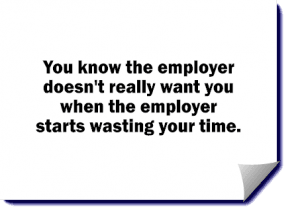In the May 23, 2017 Ask The Headhunter Newsletter, a reader tries really hard to satisfy a stupid recruiter who doesn’t give a rat’s batootie about job applicants.
Background
 We’re going to skip the regular Q&A column in this edition. Instead, I’d like to highlight a problem that I think most job seekers face: Stupid recruiters (and employers) that waste your time. (For another example, see Stupid Recruiter Story #1.)
We’re going to skip the regular Q&A column in this edition. Instead, I’d like to highlight a problem that I think most job seekers face: Stupid recruiters (and employers) that waste your time. (For another example, see Stupid Recruiter Story #1.)
An Ask The Headhunter subscriber applied to a job posted by a major defense contractor in Silicon Valley. The job description is detailed and includes a list of qualifications. What happened next is an object lesson in how corrupt recruiting has become.
Here are the e-mails between the employer and applicant. Names have been redacted.
From the recruiter
[Dear Applicant],
Thank you for your resume submittal to Requisition Number: XXXXX – [Job Title – the job is in communications]. I have some additional questions for you in regards to this specific position.
Please take a few moments to review and respond to the questions below. For your reference, a copy of the job description is provided at the end of this message.
- What is the primary reason you are seeking a new opportunity?
- How does your background relate to this specific position?
- How would you describe the role of internal/employee communications in terms of adding true business value to the company?
- Briefly, what are some of the unique approaches or tools you have used to execute an internally focused communications plan?
- How do you measure success?
- What is your salary expectation (please provide a specific amount or range)?
- Are you willing to work in United States>California>Sunnyvale?
- What is the best way to contact you during the day? Please provide an email address or phone #.
Thanks again for your interest in this position and I look forward to hearing from you soon!
Best regards,
[Recruiter’s Name and e-mail address]
Talent Acquisition
Those are some pretty heavy-duty questions if you’re the candidate — and your answers could make or break the opportunity. If it seems these are the kinds of questions you’d get in a face-to-face interview, it’s because they are.
How much time has the recruiter invested so far? Well, how long does it take to copy/paste?
The applicant responds
Happy Friday, [Recruiter’s name]!
Please see answers to questions below. The fact that I put much thought into these answers, as you will soon see, is an understatement. :)
[Applicant]
The applicant answers all the questions thoughtfully and in detail. He estimates he spent 45 minutes to an hour answering all the questions, plus time submitting the application.For our purposes, the answer to only one question is relevant.
- What is your salary expectation (please provide a specific amount or range)? As in life, everything is negotiable, including salary. I’m sure there is a salary range in mind HR has budgeted for this role, and that will suit me fine. For me, waxing poetic about the job is more important right now. That said and major hint alert, Sunnyvale is in the heart of one of the most expensive places on the planet, Silicon Valley. :)
This qualifies as, “I’ll show you mine, if you’ll show me yours first.” It’s an insulting way to entice, attract, recruit… or to start any personal interaction with another. (Here are more examples: 2 really insulting interview questions.) The applicant demurred politely.
From the applicant
Five days later, having heard nothing back, the applicant sends this e-mail:
Hi [Recruiter],
Haven’t heard from you in a while. Would love to take next steps.
Regards,
[Applicant]
From the stupid recruiter
Another day goes by. It’s clear why the recruiter has not responded already. But now she “circles back.”
Hi [Applicant],
My apologies on not circling back with you. To your point on the expensive price tag of Silicon Valley, we really need to understand a candidate’s salary requirements prior to proceeding. We have had a few too many cases of getting well down the road (even to offer), only to find out that our salary expectations do not line up.
If you could please circle back with me regarding where you currently are in salary and what your expectations are if you make a move, I will be able to let you know if that is within our range.
Best regards,
[Recruiter]
Sr. Talent Acquisition Business Partner
That e-mail could have taken as much as 2 minutes for the recruiter to write. In half the time, all the recruiter really needed to say was: “Salary range on the job is $X-$Y. If that suits you, let’s talk. Otherwise there’s no need for us to go farther down the road.”
But she didn’t do that. Having lured the applicant into investing a lot of time providing thoughtful answers to important interview questions, the recruiter now tries to get the applicant to compromise his negotiating position.
“Circle back?” Or, keep going in circles? “Prior to proceeding?” The applicant has proceeded pretty far already with nothing to show for it.
The recruiter says she is avoiding “getting well down the road.” But the stupid recruiter has sent the applicant well down the road already while she’s still ensconced in her personnel office, having invested nothing.
From the applicant
The applicant blind copied me on his last response to the recruiter.
Hi [Recruiter].
Happy Thursday. Hope this message finds you well. I’d like to introduce you a recruiting friend of mine, Nick. I think he has the answer you’re looking for.
Best Regards,
[Applicant]
Nick’s Advice
For the full effect of the applicant’s answer, you have to click the link he included.
What’s corrupt about this recruiting episode is that the recruiter teased the applicant about a job opportunity by asking him to deliver detailed answers to serious questions. These are questions that would normally be asked in a face-to-face interview. But the recruiter didn’t invest in an interview. She lured the applicant into wasting his time interviewing himself.
The recruiter doesn’t give a rat’s batootie about the job applicant. That’s stupid.
Let’s interview by e-mail!
The applicant never heard back from the recruiter. (See Rude Employers: Slam-Bam-Thank-You-Ma’m.) But he says he had a similar run-in with a recruiter at another defense contractor.
When I was on the phone with the in-house recruiter, she asked me about my salary. I said “negotiable.”
The response I got was criminal:
“That’s not good enough, [Applicant]. You’re going to have to tell me your range. Let’s start with your current job. How much are you making now?”
That’s not recruiting. That’s an interrogation by a hostile attorney. That’s not an interview. That’s a waste of time. Don’t interview by e-mail.
What qualifies this as a Stupid Recruiter Story is, of course, the recruiter’s abject stupidity. She chose this applicant from all submissions because he made the cut. He’s desirable. There’s nothing smart about insulting a job applicant you think might want to hire.
If you’re the job applicant, what can you do? Let’s talk about that.
Is you is, or is you ain’t?
After you’ve submitted an application or resume to an employer, either they’re interested in you, or they’re not. When employers respond after you apply, that means you made some kind of “cut.” You passed a test. You stood out enough. Expect an interview, or cut them off. When they try to take several bites of the apple by e-mail, they’re wasting your time.
When the recruiter replies to your application with more requests for more information, try one or more of these responses — which tests whether they’re really interested:
- “Thanks for your interest. I’m glad you have more questions for me. I have questions not answered by your job description, too. When would you like to interview face to face?”
- “As my application indicates, I’m interested in interviewing. If you are, too, let’s talk in person.”
- “I applied, and you responded, so there’s mutual interest in discussing working together. When would you like to meet?”
- “I applied for the job and you responded with interest. The next step is to meet. Sorry, but I don’t conduct interviews by e-mail or even on the phone. Since we’re both interested enough to contact one another, the next prudent step is an interview. If I don’t receive a date and time from you, I’ll expect you’re not really serious.”
If they is, good — have a meeting. If they ain’t, that’s good, too — it frees you to move on. Don’t let anyone waste your time.
So, why do job seekers do it?
Are we all crazy? You know as well as I do that this is how most “job opportunities” play out. So, why do job seekers do it? Why do they consent to wasting their time, when the employer invests no time? What could job seekers do to change all this?
: :


 Nick’s Reply
Nick’s Reply Colleges have an obligation to deliver ROI
Colleges have an obligation to deliver ROI First, a little background.
First, a little background. When they’re job hunting, people rationalize. They’re afraid they won’t get picked, so they tolerate all kinds of niggling abuse. Making someone jump through hoops — online forms, silly rules about when references are due, eating dust when HR serves it — is not right, smart, or good business. But job seekers will probably jump through hoops because they want a shot at a job. Or that’s what they tell themselves. It’s for a shot at the job. So they tolerate demeaning and meaningless demands.
When they’re job hunting, people rationalize. They’re afraid they won’t get picked, so they tolerate all kinds of niggling abuse. Making someone jump through hoops — online forms, silly rules about when references are due, eating dust when HR serves it — is not right, smart, or good business. But job seekers will probably jump through hoops because they want a shot at a job. Or that’s what they tell themselves. It’s for a shot at the job. So they tolerate demeaning and meaningless demands. I’m a doctor running a solo medical practice. How do small businesses like mine get good managers and staff? I have two medical assistants I’m dependent on to keep work flow steady.
I’m a doctor running a solo medical practice. How do small businesses like mine get good managers and staff? I have two medical assistants I’m dependent on to keep work flow steady.